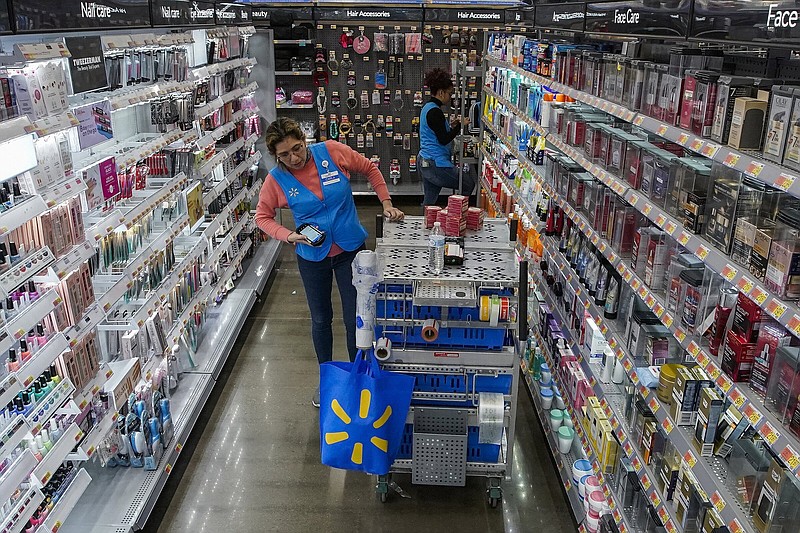A strike by UPS drivers, like the action threatened earlier this week, would not be a problem for Walmart because it is "largely insulated" from such disruptions, a researcher said.
United Parcel Service and the Teamsters union averted a strike on Tuesday by agreeing to a tentative contract, but the dispute raised the question about how retailers would deliver online orders if UPS drivers walked off the job.
Many large companies have reduced their dependence on UPS in recent years with their own platforms for last-mile deliveries, whether developed in-house; purchased; or contracted out.
Last-mile delivery means getting an online order from a store or warehouse to wherever the customer wants it delivered.
A Walmart Inc. spokeswoman said Tuesday that the company doesn't disclose information about how it has prepared to handle a UPS strike or what percentage of its deliveries are currently made by UPS.
But a researcher at the Supply Chain Management Research Center at the University of Arkansas' Walton College of Business said a UPS strike would have "little direct effect" on the retailer.
Research associate Andrew Balthrop said Wednesday that e-commerce accounts for only a small portion -- roughly 10% -- of Walmart's revenue. And only a fraction of that is parcel delivery, where Walmart is more likely to use FedEx or the U.S. Postal Service, he said.
"So its e-commerce business -- and certainly its business overall -- is largely insulated from any disruption at UPS," Balthrop said.
Walmart could still be affected indirectly in a couple of ways, Balthrop said.
Its e-commerce competitors such as Amazon could be significantly disrupted, he said, driving consumers toward Walmart. In this case, Walmart could benefit.
Balthrop said he suspects this effect would be minimal, though.
"E-retailers will have contingency plans in place in the case their primary parcel carrier goes down, even more so if the potential disruption is telegraphed ahead of time, as with the UPS strike," he said.
But a bigger effect of a UPS strike, Balthrop said, would be the loss of parcel capacity.
"As businesses bid for substitute capacity, they drive up rates for everyone, including Walmart," he said.
"Parcel rates are already up about 5% year over year," Balthrop said. "This would increase them substantially -- you could see holiday-type rate hikes in July."
Walmart said in June that its largest local delivery service provider is Spark Driver, the last-mile delivery platform it built five years ago.
Nav Chadha, Walmart's vice president of on-demand delivery, didn't say how many Spark drivers it has, but did say the number of drivers on the platform has tripled in the past year.
The Uber-like program that started operating from 800 stores is now available at about 4,000 of Walmart's 4,600 U.S. stores, Chadha said.
"In the past five years, the Spark Driver program has grown to operate in all 50 U.S. states across more than 17,000 pickup points, with the ability to reach 84% of U.S. households," Chadha said.
Spark drivers are independent contractors who choose from the Spark app which delivery opportunities they wish to take. They pick up the ordered items from the store and deliver them to the customer's home, sometimes within an hour.
Walmart also uses the Spark Driver app to make "white glove" deliveries for other businesses. "White glove" means the delivery vehicles don't have a Walmart name or icon on them.
Walmart rival Target Corp. acquired a same-day delivery company called Shipt for $550 million in late 2017. However, it still uses "carrier partners," its website says.
But Target's biggest supply chain news, released in June, is the recent opening of a smaller version of the company's sortation centers.
The Target Last Mile Delivery extension helps get orders to customers outside the sortation center's delivery radius, the company said. The first extension center just opened outside Smyrna, Ga., at a fraction of the cost of a full-size sortation center.
"It has already had an immediate impact, increasing the number of people we can serve ... by over 30%," the Minnesota-based company said. "This puts our next-day delivery within reach of 500,000 additional guests, for a total of more than 3 million in the Atlanta market."
DaVion Ezell, operations director for Target's Atlanta sortation center and the new Target Last Mile Delivery extension, said employees on the project have been excited to be part of something new, and are sharing ideas on how to continuously improve the process.
"We're actively problem solving to be sure that we are set up for success as we get closer to the holiday season, to be able to achieve and exceed that demand," Ezell said.
Macy's has used several companies for last-mile delivery over the last few years. But currently, according to its website, the department store chain uses DoorDash, another business that lets drivers pick and choose the delivery runs they want to make.
According to the online magazine Supply Chain Drive, Amazon has been pulling back on its use of UPS over the last few years, using it only in areas that its network of logistics facilities can't reach.
At the same time, the magazine said, the e-commerce giant has started its own driver platform, called Amazon Flex. The magazine said Flex now serves 100 cities and is quickly moving into more.

